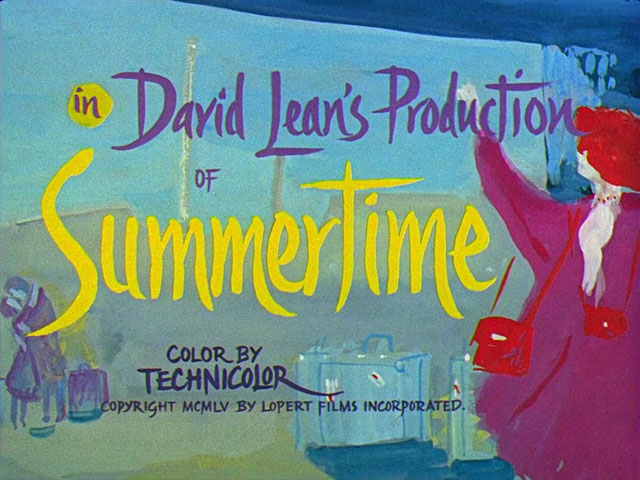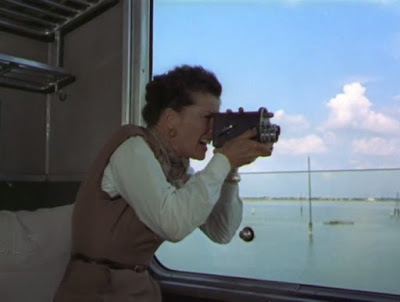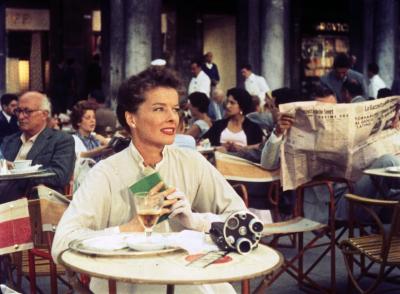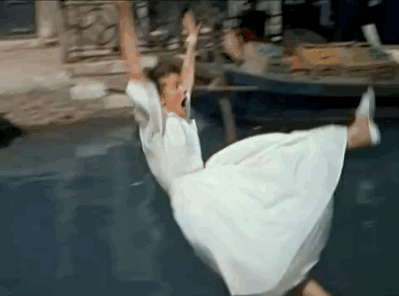Episode 29 of 52: In which David Lean's beautiful romantic classic gives Katharine Hepburn an eye infection and me a headache

I admit it. The spinster movies confuse me. When Nick and Nathaniel invited me on the podcast (Have you listened to the podcast? Go listen to the podcast), I stated outright that I don’t like Summertime. As a fan, I take almost personal offense hearing my idol continuously called “plain” or (at best) “interesting-looking.”
But as a cinephile, David Lean’s 1955 love letter to Venice engages me. I can’t help it. I’m a sucker for a scopophilic travelogue cinematography. And trains. And Technicolor films that overuse the color red. And judging from last year's Hit Me With Your Best Shot submissions for Summertime, many of you share my inner conflict.
Summertime is more a mood piece than a plot-driven story. David Lean exorcised most of the third act from Arthur Laurents’ original play, Time of the Cuckoo, in order to create a sweetly romantic view of Venice, love, and September romance. Kate plays Jane Hudson, a secretary from Akron, Ohio who comes to Venice for… something. Adventure, maybe? Hanging out the window of the train to the city with her 8mm camera rolling, Jane proves herself immediately to be a curious and active observer.
Red goblets be damned; that 8mm camera is most important object in David Lean's movie. [More...]

The camera is the physical manifestation of Jane’s curiosity and excitement. As Jane travels through the city, camera in hand, cinematographer Jack Hildyard will often use her camera’s point of view--though not actual 8mm film--to show the audience exactly what Jane sees. In a sensitively introspective performance, Kate makes each lingering look Jane takes at the city an active, emotional observation. Venice remains beautiful in any mood, but Kate's small shifts in mood signal whether she sees company or solitude when she watches strolling couples or paired stone lions. (Lean would later use this intimate point of view trick to equal effect in Doctor Zhivago.) It turns out that the camera lens is as much a shield against the world as it is a way to examine it.
 Observing but not yet observed. Notice the camera in arm's reach.
Observing but not yet observed. Notice the camera in arm's reach.
Then the shopkeeper Renato de Rossi (Rossano Brazzi) enters Jane's life, and she ditches the camera for a red goblet and a pair of heels. de Rossi is introduced with his own POV shot as he stares at Jane's shapely legs a table away from him, uniting de Rossi and Jane as two people who see beauty in overlooked places. After a quick courtship, de Rossi and Jane engage in some Code-dodging love scenes among (literal) fireworks. But even then, the camera continues to be as interested in the city as it is in its lovers. I get that temptation. Venice is gorgeous. Plus, de Rossi is basically a Bruno Mars song in Italian, giving Jane external validation and crooning, "Girl, you're amazing/così come sei."
And here’s my problem: what does Jane gain from this? The film ends and Jane hops on the train before we can get any clear idea of what life-affirming possibilities de Rossi’s magic penis and her Character Development Deflowering may have opened for her. It's clearly supposed to be something big. Will Jane return to Akron with the desire to explore life more thoroughly? Will she replay her Venetian love affair on lonely winter nights? Or will she file this away as just a moment in the woods? The ending is ambiguous but elated. Jane leaves Venice as she entered it, hanging out the window, but this time there is no 8mm camera between her and the world.

Kate was starting a new adventure in her career as well. After Summertime wrapped, Kate signed with the Old Vic Company to tour Australia in three Shakespearean comedies. This despite an infamous recurring staph infection in her eye caused by falling into the canals in Summertime. Even at 47, Kate was pushing herself to get better! Keep that in mind. Maybe it’ll help us forgive her for next week's movie.

 Previous Week: Pat and Mike (1952) - In which Katharine Hepburn proves hitting like a girl is a good thing.
Previous Week: Pat and Mike (1952) - In which Katharine Hepburn proves hitting like a girl is a good thing.
Next Week: The Iron Petticoat (1956) - In which you’d think Katharine Hepburn would have learned to stay away from accents by now.
Tuesday 8/12: Hit Me With Your Best Shot crossover - Suddenly, Last Summer